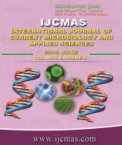


 National Academy of Agricultural Sciences (NAAS)
National Academy of Agricultural Sciences (NAAS)

|
PRINT ISSN : 2319-7692
Online ISSN : 2319-7706 Issues : 12 per year Publisher : Excellent Publishers Email : editorijcmas@gmail.com / submit@ijcmas.com Editor-in-chief: Dr.M.Prakash Index Copernicus ICV 2018: 95.39 NAAS RATING 2020: 5.38 |
Brinjal production is threatened by bacterial wilt caused by Ralstonia solanacearum in the developing world. Evaluation in search of best performing genotypes against bacterial wilt disease and incorporating their genes in commercial cultivars is an effective attempt to the problem. Studies on genetic variability and heritability, along with degree of association between the various characters and direct effects of yield contributing characters on total yield, is of paramount significance in framing an appropriate breeding strategy. The proper choice of parent based on genetic divergence is a pre-requisite in plant breeding programme. In the present study reactions of 23 brinjal genotypes, in terms of bacterial wilt incidence differed at different days after transplanting (DAT). Thirteen genotypes showed resistant reactions, five genotypes were categorized as moderately resistant, and two genotypes each exhibited moderately susceptible and susceptible reaction up to 90 DAT. Resistant genotypes had comparatively lower mean fruit weight than other categorized groups, revealing the fact that small fruited genotypes are linked with disease resistance. High heritability coupled with high genetic advance was recorded in bacterial wilt incidence and other important traits indicating that the selection among the genotypes can bring about significant improvement in disease tolerance due to presence of additive genes in trait. The absence of relationship between genetic diversity and geographical distance indicated that selection of genotypes for hybridization should be based on genetic divergence rather than geographic diversity. Based on multivariate analysis and average values three elite brinjal genotypes 16/BRBW RES-2, 2012/BRBW RES-5 and 2012/BRBW RES-6, which had recorded high bacterial wilt resistance coupled with diverse horticultural traits, could be utilized as donor parents either for developing hybrids or to isolate promising lines, in segregating generation, resistant to this disease.
 |
 |
 |
 |
 |